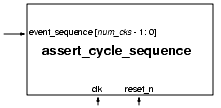
|
Parameters:
severity_level
num_cks
necessary_condition
property_type
msg
coverage_level
|
Class:
n-cycle assertion
|
Ensures that if a specified necessary condition occurs, it is followed by a specified sequence of events.

|
Parameters:
severity_level
num_cks
necessary_condition
property_type
msg
coverage_level
|
Class:
n-cycle assertion
|
assert_cycle_sequence
[#(severity_level, num_cks, necessary_condition, property_type, msg, coverage_level )]
instance_name (clk, reset_n, event_sequence );
The assert_cycle_sequence assertion checker checks the expression event_sequence at the rising edges of clk to identify whether or not the bits in event_sequence assert sequentially on successive rising edges of clk. For example, the following series of 4-bit values (where b is any bit value) is a valid sequence:
1bbb ——> b1bb ——> bb1b ——> bbb1
This series corresponds to the following series of events on successive rising edges of clk:
|
cycle 1
|
event_sequence[3] == 1
|
|
cycle 2
|
event_sequence[2] == 1
|
|
cycle 3
|
event_sequence[1] == 1
|
|
cycle 4
|
event_sequence[0] == 1
|
The checker also has the ability to pipeline its analysis. Here, one or more new sequences can be initiated and recognized while a sequence is in progress. For example, the following series of 4-bit values (where b is any bit value) constitutes two overlapping valid sequences:
1bbb ——> b1bb ——> 1b1b ——> b1b1 ——> bb1b ——> bbb1
This series corresponds to the following sequences of events on successive rising edges of clk:
When the checker determines that a specified necessary condition has occurred, it subsequently verifies that a specified event or event sequence occurs and if not, the assertion fails.
The method used to determine what constitutes the necessary condition and the resulting trigger event or event sequence is controlled by the necessary_condition parameter. The checker has the following actions:
 ‘OVL_TRIGGER_ON_MOST_PIPE
‘OVL_TRIGGER_ON_MOST_PIPE
The necessary condition is that the bits:
event_sequence [num_cks -1], . . . ,event_sequence [1]
are sampled equal to 1 sequentially on successive rising edges of clk. When this condition occurs, the checker verifies that the value of event_sequence[0] is 1 at the next rising edge of clk. If not, the assertion fails.
The checking is pipelined, which means that if event_sequence[num_cks -1] is sampled equal to 1 while a sequence (including event_sequence[0]) is in progress and subsequently the necessary condition is satisfied, the check of event_sequence[0] is performed (unless the first sequence resulted in a fatal assertion violation).
 ‘OVL_TRIGGER_ON_FIRST_PIPE
‘OVL_TRIGGER_ON_FIRST_PIPE
The necessary condition is that the event_sequence [num_cks -1] bit is sampled equal to 1 on a rising edge of clk. When this condition occurs, the checker verifies that the bits:
event_sequence [num_cks -2], . . . ,event_sequence [0]
are sampled equal to 1 sequentially on successive rising edges of clk. If not, the assertion fails.
The checking is pipelined, which means that if event_sequence[num_cks -1] is sampled equal to 1 while a check is in progress, an additional check is initiated.
 ‘OVL_TRIGGER_ON_FIRST_NOPIPE
‘OVL_TRIGGER_ON_FIRST_NOPIPE
The necessary condition is that the event_sequence [num_cks -1] bit is sampled equal to 1 on a rising edge of clk. When this condition occurs, the checker verifies that the bits:
event_sequence [num_cks -2], . . . ,event_sequence [0]
are sampled equal to 1 sequentially on successive rising edges of clk. If not, the assertion fails.
The checking is not pipelined, which means that if event_sequence[num_cks -1] is sampled equal to 1 while a check is in progress, it is ignored, even if the check is verifying the last bit of the sequence (event_sequence [0]).
| |
ASSERT_CYCLE_SEQUENCE
|
The necessary condition occurred, but it was not followed by the event or event sequence.
|
| |
illegal num_cks parameter
|
The num_cks parameter is less than 2.
|
assert_change, assert_unchange
Ensures that a ‘WR, ‘WAIT sequence in consecutive cycles is followed by a ‘DONE or ‘WR. The sequence checking is pipelined.

Ensures that a ‘WR is followed by a ‘WAIT or another ‘WR, which is then followed by a ‘WAIT or a ‘DONE (in consecutive cycles). The sequence checking is pipelined: a new ‘WR during a sequence check initiates an additional check.

Ensures that a ‘WR is followed by a ‘WAIT or another ‘WR, which is then followed by a ‘DONE (in consecutive cycles). The sequence checking is not pipelined: a new ‘WR during a sequence check does not initiate an additional check.

|
© Accellera Organization, Inc. 2005 All Rights Reserved. |
Standard OVL V1.1a |